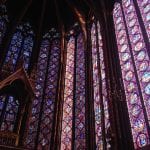Millions and millions of people have worshiped the moon throughout history. Such worship is—needless to say—ruled out of bounds by Scripture. It is worth reflecting, though, on why people would worship the moon. One easy answer is that people are idolatrous by nature, and if they will not worship God, then they will worship something else.
Yet this response does nothing to explain why it’s the moon that has been the object of such worship. There is a beauty, power, soft light, and majesty that is unique to the moon. It is the governing queen of the night sky.
Moreover, the moon waxes and wanes, recapitulating its regular cycle of birth, growth, fullness, decline, and death. Imagine living away from light pollution, thousands of years ago, before hearing about the revelation of Yahweh. I don’t find it difficult to imagine looking up at the moon and its royal entourage of stars, feeling moved by the wonder and glory of the night sky, and feeling drawn to worship.
If you hadn’t heard of God, it would be easy to misdirect that feeling toward created things. Genesis 1:14-19 and Psalm 19:1-6 teach that God made the sun, moon, and stars. Each reveal his glory. We are supposed to be struck by glory when we see the moon! But, just as the moon is not the source of light (it reflects the sun’s light), it is not the source of glory: it reflects the glory of God.
S. Lewis and Lady Luna
Last spring, I was able to teach a course on C. S. Lewis at Heritage Seminary. We read many of his best known works and explored his theology and philosophy. The goal was to have an experience of Lewis.
Many evangelicals don’t know that Lewis wanted to be a poet. His first book publication was a cycle of poems, many of which raged against God. His poem French Nocturne was written about his experience in the trenches of the First World War. Some of the lines run this way:
There comes a buzzing plane: and now, it seems
Flies straight into the moon.
Lo! where he steers
Across the pallid globe and surely nears
In that white land some harbour of dear dreams!
False mocking fancy! Once I too could dream,
Who now can only see with vulgar eye
That he’s no nearer to the moon than I
And she’s a stone that catches the sun’s beam.
The perspective of imagination and magic is absent. Phenomenologically, it looks like a plane can crash into the moon. Yet the materialist knows there’s no land of dreams on the moon, and the plane really isn’t closer to touching it than is the man in the trenches. Feel the heavy, sinking cadence of, “And she’s a stone.” She doesn’t even produce her own light. Realism sees through it all. It is a “False mocking fancy!”
Compare this with Lewis’ later poem, The Planets. He begins this work with the line, “Lady Luna, in light canoe.” The words are so light and lilting; the magic is restored. Once again, the moon is wonderful and enchanting. It can be loved.
Why? Although Lewis is exploring mythology in this poem, it is mythology as he understands it in the service of God. Ultimately, whatever wonders and powers that exist were created by God. Lesser regents can thrill our hearts, and they are meant to: they are meant to lift us up and then point us beyond themselves to their Maker and King.
The Discarded Image
Rarely read by evangelicals, yet a rich treasure, The Discarded Image, Lewis explores the Medieval view of the universe. Amongst other things, in this work he explores the Medieval view of the universe. Ponder the beauty of this vision, and then compare and contrast it with other worldviews:
“If the reader cares to repeat the experiment, already suggested, of a nocturnal walk with the medieval astronomy in mind, he will easily feel the effect of these two last details. The ‘silence’ which frightened Pascal was according to the Model, wholly illusory; and the sky looks black only because we are seeing it through the dark glass of our shadow. You must conceive yourself looking up at a world lighted, warmed, and resonant with music.” (Cambridge University Press: 2013, p. 112)
“Whatever else a modern feels when he looks at the night sky, he certainly feels that he is looking out—like one looking out from the saloon entrance on to the dark Atlantic or from the lighted porch upon dark and lonely moors. But if you accepted the Medieval Model you would feel like one looking in. The Earth is ‘outside the city wall’.” (p. 118-119)
Christianity, Materialism, and Paganism
Materialists look at the moon and see a stone reflecting light. Many pagans have looked at the moon and seen power, glory, and light which caused them to misdirect their impulse to worship. As is so often the case, there is an element of truth in every view. The moon is a physical object, a stone in orbit that reflects the sun’s light. It is also so beautiful it can touch our hearts and cause strong feelings of wonder and awe to arise. Christians can combine these understandings, but we can add the critical piece that makes it all coherent, and even more wonderful. The moon is part of the creation—it is not divine.
Yet it is more than a stone! It exists as a mirror of glory, and when we see it we ought to worship. But we ought to worship God and not what he has made. Believers can look up at the night sky as the heavens, rather than as space. There we see joy, love, and harmony.
I have taken Lewis’ experiment to heart and spent much time walking under the night sky, reminding myself that I am not looking out into a vast emptiness: I am standing at a window and looking in to where there’s a warm fire, celebration, good friends, good talk, and great joy. I can tell you that this understanding radically changes a night walk under Lady Luna’s glow.
The moon is intrinsically beautiful, and it should lift our minds and our hearts to Beauty Himself. Next time you see Lady Luna in the night sky, consciously think of her as a Christian ought to think. Allow yourself to love and worship the Creator through the enjoyment of what he has made. Whereas other worldviews may understand something about the moon, they only have a half-moon stitched together. A Christian worldview allows for the only proper moonview, and it is exquisite.
























